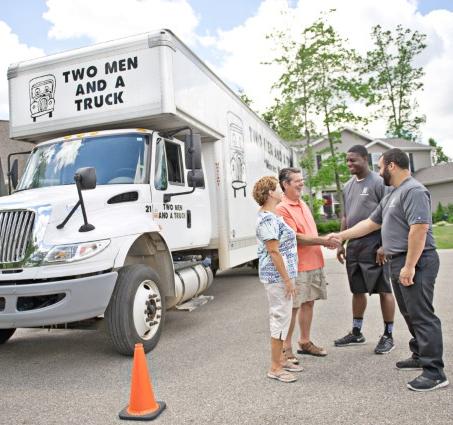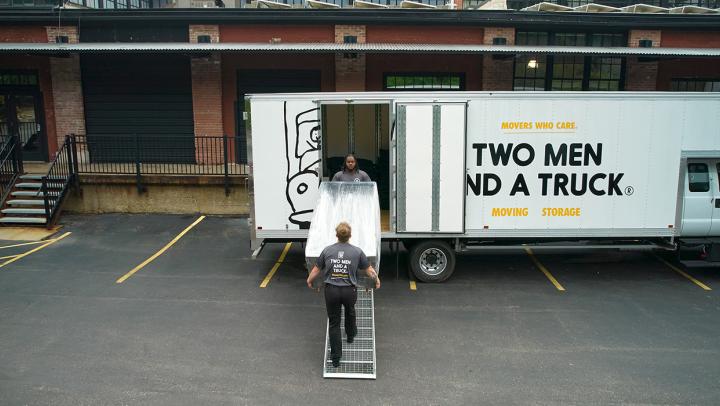When it comes to home relocations or renovations, the refrigerator often emerges as the biggest and heaviest household appliance. Due to their substantial size and weight, moving refrigerators often demands significant effort. At TWO MEN AND A TRUCKⓇ, we excel in the delicate art of moving large and heavy items with finesse and expertise. And because we are the MOVERS WHO CAREⓇ, we've curated a comprehensive guide to aid your next refrigerator move, and we're excited to share it with you.
This guide will walk you through all the necessary steps to properly move your refrigerator.
What You Need
-
Dolly
A dolly is an essential equipment for moving a refrigerator due to its specialized design, which allows for easier navigation of large and heavy items. The dolly's sturdy construction and wheels help distribute the weight of the refrigerator, making it easier to transport without straining yourself or risking damage to the appliance or surrounding surfaces.
-
Straps
You need straps to secure your refrigerator to the dolly so it doesn’t slip off when moving.
-
Moving blankets
Blankets provide crucial protection against scratches, dents, and other damages. Refrigerators typically have smooth surfaces that are prone to scuffs and marks, especially when being moved or shifted. By wrapping the fridge in moving blankets, you create a protective barrier that cushions it against impacts and friction during transit.
-
Tape
We recommend you use tape to seal the refrigerator doors so they remain closed during the move. You’ll also need tapes to secure the moving blankets around the refrigerator.
-
Cooler(s)
If you have any perishable food items in your refrigerator when you need to move, you need coolers to store these items temporarily.
-
Gloves
We recommend you put on a pair of gloves during the move. This gives you a better grip while protecting your hands from scuffs and scratches.
Step-by-Step Instructions
-
1Step 1Empty the refrigerator
The first thing you need to do when moving your refrigerator is to remove everything inside it. This makes the appliance lighter and easier to move. It also prevents your items from shifting or spilling inside the refrigerator.
-
2Step 2Unplug From the power source
Before you try moving your refrigerator, you have to unplug it from the power source. After unplugging, secure the power cord to ensure it doesn’t dangle during the move.
-
3Step 3Defrost and clean
After emptying your refrigerator, you need to check if it has an ice build-up. If you notice any, you must defrost it at least a day before the move. Once defrosted, clean the refrigerator’s interior to prevent unpleasant odors.
-
4Step 4Measure the refrigerator
We recommend you measure your refrigerator to confirm if it will fit through the doorways, stairways, and hallways it needs to move through. Once you’ve gotten these measurements, you can map out the best route for the move and the best spot to move the refrigerator.
-
5Step 5Secure the doors
You need to secure the fridge doors so they don’t swing open during the move. We recommend you use strong tape, bungee cords, or straps to secure the doors.
-
6Step 6Secure the refrigerator
We recommend you get help for this step. Enlist your friend or neighbor to help you tilt the refrigerator carefully while you slide the dolly underneath. Ensure the appliance is centered and balanced on the dolly, then secure it with straps. It is important to note that you should always position your refrigerator upright on the dolly. When you lay it on its side on the dolly, oil from the compressor may seep into the cooling lines and cause you many problems.
-
7Step 7Move it
Slowly move the refrigerator with one person guiding the dolly and another pushing from the back. You need to ensure that both of you maintain a steady pace. Remember that this is a heavy item; do not go too fast.
-
8Step 8Load into the truck
Keep the refrigerator upright even as you move it off the dolly and onto the moving truck. Use a loading ramp to move it onto the truck. Once safely in the truck, secure the refrigerator with ratchet straps inside the load bed. This prevents it from moving or slipping as the truck moves.
-
9

Thinking of Moving Yourself?
Think Again!
While moving yourself may seem less expensive... the costs add up.
Do-It-Yourself Moving Costs:
- Truck Rental
- Mileage
- Fuel Charge
- Additional Insurance
- Equipment Rental
(straps, rope, furniture pads, bungee cords, stretch wrap, dollies, etc.)
- Time
- Boxes & Packing Supplies
- Possible Damages
(belongings, relationships, & injuries)
- Recruiting Friends to Help
- Food & Beverages
- Chiropractor Visits
- Packing a Truck
- Learning How to Maneuver a Moving Truck
- Broken Promises
Call TWO MEN AND A TRUCK
We can move as much or as little as you need while fitting your schedule & budget!







